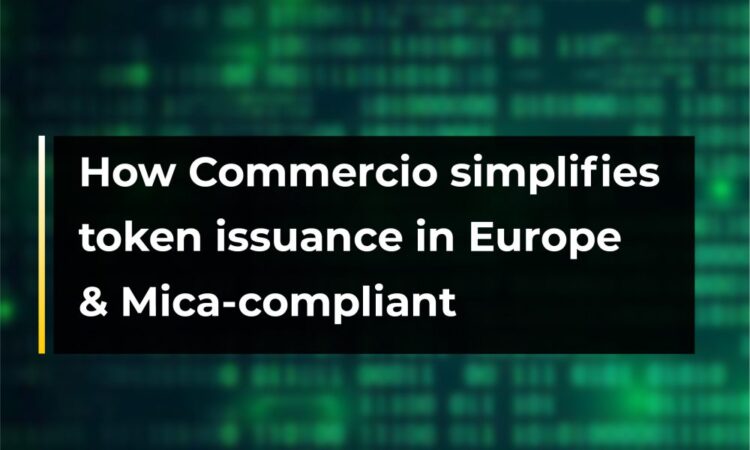
Europe’s progressive stance on the digital economy is evident, as seen in the implementation of the MiCA (Markets in Crypto Assets) regulation. This EU law aims to establish a comprehensive legal framework for governing crypto assets across the European Union.
The primary goal of MiCA is to facilitate the regulation of distributed ledger technology (DLT) and virtual assets in the EU while safeguarding users and investors.
However, bridging the gap between understanding MiCA’s requirements and launching compliant tokens in Europe presents a significant challenge.
Enrico Tallin, the founder of Commercio Network, introduced a remarkable solution to tackle this issue at the Cosmoverse event. Commercio Network is an open-source blockchain software that empowers network participants to oversee an immutable ledger of transactions.
It intends to simplify compliance with the rules outlined in MiCA, providing a promising avenue for navigating this complexity. The goal is to bring commercio.network to 250 million companies, and for that purpose, a comprehensive offering has been developed based on nine pillars.
These pillars include the free and open-source Commercio Core, Commercio Explorer, Commercio Wallet Light, the paid Commercio Wallet PRO, Commercio API, Commercio ID, Commercio Network, Commercio Governance, and Commercio Marketplace.
Commercio Network is an open-source blockchain software that enables network participants to manage a distributed ledger of immutable transactions. It provides a complete solution based on these nine pillars, intending to bring commercio.network to 250 million companies.
The company’s objective is to revolutionize the global financial space and create a product ecosystem that nurtures the future of finance.
Why MiCA is important
Enrico explained that the MiCA project is vital in bringing clarity to the crypto landscape in Europe. It aims to promote a healthy and secure digital market by providing a clear set of rules for issuing utility tokens.
He argued that unlike what is obtainable in a vast majority of the crypto market today, it is important for utility tokens to be compliant with MiCA which is a step towards ensuring legitimacy and consumer protection.
Under these regulations, European companies can issue utility tokens for as little as 1 million euros, provided they follow the prescribed rules.
How to issue MiCA-compliant utility token
According to the founder, the first step to launching a MiCA-compliant utility token is to understand MiCA, as they define what a utility token can and cannot do. MiCA allows for utility tokens, asset reference tokens, and stablecoins.
He added that project teams must also define the purpose of their token. It is crucial to determine the function of the utility token. It must provide access to a genuine product or service and should not be marketed as a financial investment.
The next step he added is the creation of a token service agreement. Draft and notarize a token service agreement that outlines the product or service the token provides, with a focus on European consumer protections.
Fourthly, he said that teams should implement a strict distribution plan for their tokens. Ensure the token’s marketing and distribution avoid any promises of profit or capital appreciation. Utility tokens should never be portrayed as a financial investment.
The last step he said is to seek legal counsel. Enlisting the services of legal experts is essential to navigate the legal intricacies of MiCA compliance.
Services provided by Commercio
To make the process of issuing MiCA-compliant utility tokens more accessible, Enrico said that Commercio Network has developed a three-step solution for any company that is interested in launching a token in Europe.
The first are the issuance tools which is a user-friendly interface to create MEU (Cosmos utility tokens) without needing extensive technical knowledge. Secondly, Commercio has a token service modeling which is a system that helps companies create a token service agreement, which can be reviewed by legal experts.
Lastly, there is the direct custody wallet. This hybrid wallet solution is designed for distributing tokens to end-users who may not be crypto-savvy, ensuring accessibility and security.
Enrico also shared that the Commercio Network has published a book on utility tokens, covering everything from the basics to Meeker regulations and how to use utility tokens in companies without classifying them as security tokens. The book, which was shared with the audience for free at the event, provides insights drawn from real-world experience.






